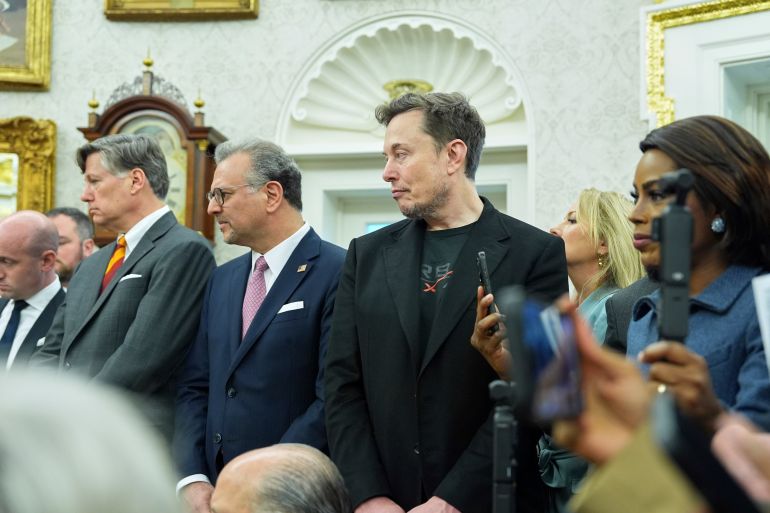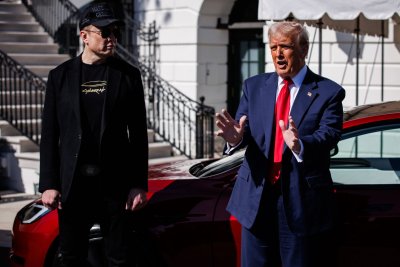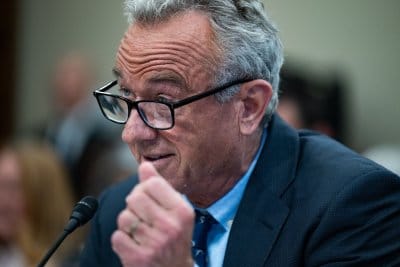Trump brushes aside Elon Musk’s criticisms of his signature budget bill | Donald Trump News
United States President Donald Trump has brushed aside criticism of his wide-ranging budget bill — known as the One Big Beautiful Bill — from a high-profile source, government adviser Elon Musk.
On Wednesday, at a swearing-in ceremony in the Oval Office, Trump faced questions about Musk’s comments, which suggested the bill would balloon the national debt.
The Republican leader responded with a degree of ambivalence, though he staunchly defended the bill’s tax cuts.
“We will be negotiating that bill, and I’m not happy about certain aspects of it, but I’m thrilled by other aspects of it,” Trump said. “That’s the way they go.”
The budget bill clocks in at over a thousand pages, and it contains a range of domestic policy priorities for the Trump administration.
That includes legislation cementing some of the tax cuts Trump championed during his first term as president, in 2017. It would also increase the funds available for Trump’s “mass deportation” effort and heightened security along the US-Mexico border.
Some $46.5bn, for instance, would be earmarked to renew construction of the southern border wall and other barriers, another hallmark of Trump’s first term in office.
But to pay for those tax cuts and policy priorities, the bill proposes measures that remain controversial on both sides of the political spectrum.
One provision, for instance, would increase the federal debt limit by $4 trillion. Others would impose strict work requirements on programmes like Medicaid — a government health insurance for low-income Americans — and Supplemental Nutrition Assistance Program (SNAP), sometimes known as food stamps.
Those work requirements are expected to bar thousands of people from accessing those safety-net programmes, allowing for cost savings. But critics fear those barriers will drive some families deeper into poverty.

In a preview of an interview with the TV show CBS Sunday Morning, Musk expressed frustration with the sheer cost of the bill, echoing criticism from fiscal conservatives.
He also accused the “Big Beautiful Bill” of setting back the progress he made as leader of the Department of Government Efficiency (DOGE), a task force Trump established to pare back “wasteful” spending.
“I was, like, disappointed to see the massive spending bill, frankly, which increases the budget deficit, not decrease it, and undermines the work that the DOGE team is doing,” Musk told CBS, dressed in an “Occupy Mars” T-shirt.
“I think a bill can be big or it can be beautiful,” he added. “I don’t know if it could be both. My personal opinion.”
This is not the first time that Musk has spoken out against a US budget bill. In December, under former President Joe Biden, Musk rallied public outrage against another piece of budget legislation that weighed in at over a thousand pages, calling on Congress to “kill the bill“.
Musk’s latest comments, however, signal a potentially widening fracture between himself and the Trump White House.
Up until recently, Musk, a billionaire thought to be the world’s richest man, has played a prominent role in Trump’s government. He even helped him secure a second term as president.
In 2024, Musk endorsed Trump’s re-election effort, joined him on the campaign trail and donated hundreds of millions of dollars to the Republican leader and his political allies.
For his part, Trump returned Musk’s warm embrace. Days after he won a second term as president, Trump announced that Musk would join his incoming administration as head of DOGE.
But Musk’s role in the White House has remained ambiguous, and highly controversial. Though Musk is a regular presence at presidential cabinet meetings, he has not had to undergo a Senate confirmation hearing.
The White House has described him as a “special government employee”, a temporary role given to consultants from business fields. Normally, those employees can only work with the government for 130 days per year, and they are barred from using their government roles for financial gain.
But critics have argued that the length of Musk’s tenure at the White House has not been clearly established and that he has indeed leveraged his position for personal profit. In March, for instance, Trump held a news conference to show off models from Musk’s car company Tesla.
Musk’s other business ventures, including the rocket company SpaceX and the satellite communications firm Starlink, have also raised conflict-of-interest questions, given that they are competitors for government contracts.
Media reports have indicated that there have been behind-the-scenes clashes between Musk and other members of the Trump White House that may have cooled relations between the president and his billionaire backer. But Trump has so far avoided criticising Musk publicly.
On Wednesday, for instance, Trump pivoted from the question about Musk’s comments to attacking Democratic members of Congress, who refuse to back his signature budget bill.
“ Remember, we have zero Democrat votes because they’re bad people,” Trump said. “There’s something wrong with them.”
A version of the budget bill narrowly passed the House of Representatives last week. Currently, it is being considered by the Senate. But with a 53-seat majority in the 100-person chamber, Senate Republicans can only afford to lose three votes if they hope to pass the bill.
Trump renewed his call for party unity on Wednesday, despite concerns from his fellow Republicans.
“We have to get a lot of votes,” Trump said. “We need to get a lot of support, and we have a lot of support.”
Some Republicans have voiced opposition to the increase in the national debt. Others fear the effects that Medicaid restrictions might have on their constituents.
Trump himself has said he opposes any cuts to Medicaid. But he has tried to frame the bill’s tax cuts as a boon to lower-income people, though critics point out those cuts are poised to deliver the biggest savings to the wealthy.
“We’ll have the lowest tax rate we’ve ever had in the history of our country,” Trump said. “Tremendous amounts of benefits are going to the middle-income people of our country, low- and middle-income people of our country.”













